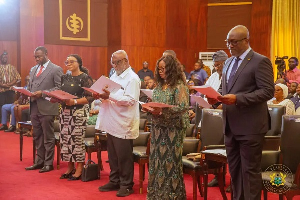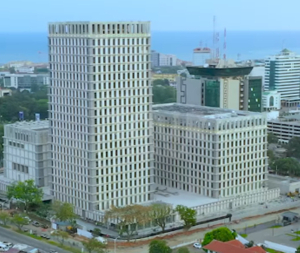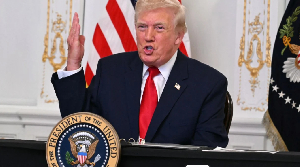As Ghana approaches its 50th birthday and focus on its future potential, we also need to reflect upon the highs and lows of our development. Many countries that we started the developmental journey with are advanced more than we are. Malaysia and India for example are countries whose per capita income were in the same range with us soon after our independence but who are far ahead today. Ghana could even give a loan to Guinea in the late 1950’s! Can we do it today?
The sad news currently is that there are relatively few success stories in Africa!
Knowledge production, resilience, determination, selflessness and believing in our own products are the key factors to success.
Ghana actively needs to copy the “Jones” that is “the developed world”. With the pace of information technology (I.T) moving fast, Ghana must keep with it or will be stuck in the mud. It was this fast pace in I.T. that allowed the West to get the competitive advantage on the former USSR.
The current climate focuses on knowledge-based economies rather than industrial economies. For example what is holding up the British economy now is services and education delivery. School fees from international students singularly account for close to half of the foreign exchange of Britain and Australia).
Based on these facts Ghana needs to seriously consider what we could also do to develop our service industries and indigenous arts such as hairdressing, tourism, craftsmanship, pottery, cultural heritage etc. We may not need to compete with any country on the international market if we export weaved kente or tie and dye for example. On the other hand, we may need to compete very fiercely on the international market if we want to export goods like detergents. In other words, Ghana must carve a market niche for itself.
It would be best if we embark on strategic industrialisation and give more attention to industries that create that Ghanaian identity.
Have we been able to live up to the challenge of development? No!
India has seen an explosion of business process outsourcing, which now accounts for over a third of the country’s foreign direct investment. A real headway indeed! Why not Ghana?
Do we as a nation have such positive belief in ourselves?
There are no I .T. facilities for our children in most schools let alone Universities. How could our children catch up with the rest of the world?
Children are still being taught under trees in rural villages. Schools constructed from very basic building materials such as mud and straw roofing.
In these modern times, and even with our global travels, Ghana does not have adequate public toilets (where there are public toilets, its state is incredibly unappetising). Also libraries (The Accra Public Library is turned into a museum of mice-bruised books) museums (with no update of exhibits – frozen in time since it’s conception) and there are hardly any community centres in town and villages.
There are few recreational facilities for children of any age.
There are hardly any purposeful designed playgrounds for children yet we have architects in Ghana who are capable. Why don’t we work in partnership with our architects to help reshape our landscape?
There are no supermarkets in our towns or villages. The idea of co-operative shops seems far too remote. Ghana really lacks the welcoming factor for customers. Special training is desperately needed in the whole system of service delivery. Given that Ghanaians are very noted for their hospitality our customer services remains primitive as compared to services in the Western world.
Service delivery training could bridge this gap if this is to be addressed strategically.
Our schools don’t even bother to engage in field trips for children. Thus to encourage and motivate them to be more curious about the environment in which they live. Is this not part of our school curriculum?
Our children lack the ability to map read let alone grasp concept of map reading skills. As compared to the Western world, independence is the key word and there are maps every where for any one who wants to explore. Ghana is moving towards tourism and perhaps ensuring that street and road map exist would be welcomed. Ghana Tourism Board may need to seriously take this on board in their strategic planning.
Our children are discouraged at a very early age to be positive and strategic thinkers thus remain timid and subdued when exposed to the outside world (Because our culture sits on the child creativity, a child is not supposed to ask questions. When a child is curious he is dubbed as a bad child. This hinders crucial confidence development of that child and the progress of our country. Children need to dare challenge the elderly. Knowing that everyone is fallible is important and we need to learn from each other.
Sex education is another factor, which is not taught by most parents and by the time children become aware of sex; they are naïve and can be exploited by the unscrupulous. The youth become victims to the wicked world out there. Rich men and women have the opportunity to corrupt our youth with desirable things such as mobile phones and other material things.
The lack of police checks on the foreign influx of people through tourism is also a significant problem, which needs to be effectively tackled head on. Although most are honest, there are some, who may be are sex deviants and disguised themselves as tourists and are targeting naïve young people. They now cast their nets world wide, choosing the countries with the weakest controls. The last backwaters of Asia, countries like Vietnam and Cambodia, have recently been in the news: where will they go next? Whose responsibility could this be perhaps? The I.G.P’s office!
Schools and the media need to portray to our youth that sacrificing and having real patience is the essential ingredient needed for every youth on the path to a successful future. We should highlight the fact that there are no real short cuts in life – only more dangerous routes. Our youth need to refrain from unnecessary peer pressure and rather focus solely on their education until they obtain any professional recognition.
Ghana needs every child on board the road to a meaningful successful transformation.
We need to invest heavily in our youth right from their nursery level to expose them to the real world at a very early age if Ghana is to catch up in any way. They are our future and would be taking care of us when we are old. These children would be strategic planners of Ghana and hence would be deciding the needs of Ghana in the next 30 years.
If we as a nation fail to invest in our children we will leave Ghana as it is today for the next generation.
The world is advancing fast, dealing with the risk and complexities of international trade.
Are we busy investing in the global market or only relying on purely on loans and foreign aid? This is called dependency, as they do not really help our development. On the contrary, they help to sustain our “short-sighted” leaders in power.
Ghana needs to adopt the can-do attitude and go for opportunities that are either easiest or least costly to exploit with a greater likelihood of success.
Solid foundation: strategic planning - investing in every youth through a guided form of education, enhanced with career counsellors, mentors and coaches to a meaningful career pathway. Ghanaians students need to grasp every opportunity to be expose to the wider world and integrate with different cultures in order to learn from international business.
These areas are necessary to make that difference in the way our children develop to build our economy to compete with the developed world.
The world is open for real business for those who are serious? At the current climate Ghana seems not to be serious enough!
Ghana cannot develop on loans. Our leaders need to generate our own income for development. What are the strategies for plan A, B, C, or D one may ask a ruling Government perhaps?
Have we got the right products to do business with? Yes we do. Do we have the right people to take the country to the next phase? Yes we do. Do we have innovative leaders to get the good out of its people? No we don’t!
Wake up leaders of today. Wake up. Ghana has no time to stand and stare at the global market. The dawn is right here!
What have we got to boast of then? Has Ghana got anything at all?
Could it be human resources, gold, diamonds, bauxite, cocoa, crude oil, palm oil, peanut oils, palmkernnel oils, sheabutter and many more?
Why are we letting foreign companies come to our country to take control of assets without even investing heavily into the areas where they are exploiting?
There is gold in Scotland but do you see the British mining it? No, ours is cheaper and labour is extremely cheap. When gold prices goes down that is when mining activities in Ghana goes up. Why?
Is it because the major partner of Ash gold is foreign owned?
Why? Why should somebody own part of our gold because of their money? Is this not what the Ashanti war was all about? Now, Ghana is inviting the same people as foreign investors and such people are only keen to benefit from our gold and hardly putting something back into our communities and country.
Look at Obuasi where Ashanti gold has its Headquarters. Let’s reflect on the living standards /conditions of the local people around the Headquarters.
There is poor and inadequate drinking water and poor sanitation around these areas. (That is what is leading to the numerous conflict in the Niger Delta area in Nigeria; the peoples Oil is being taken but nothing is done by the expatriates to enhance their community’s development)
It does not make sense to have a Headquarters of this nature generating significant wealth from Obuasi when the natives are languishing in squalor with no proper toilet facilities and other basic amenities. That is library and I.T facilities, public toilets, community centre.
Is Ashgold helping to increase the economic development of Obuasi?
By this one means working with the local chiefs and the community to promote regeneration, investments, skills, training, employment and efficiency and competitiveness?
Does Ghana have an Industrial Development Advisory Board to monitor such activities? Something we need to consider perhaps!
It appears about 90% of all profits from some major organisations are being sent back to foreign banks. What is in it for us then? Let’s ask ourselves? Shouldn’t the deal be a 50-50; win win situation?
Certainly, this balance is wrong and needs to be challenged in an effective and efficient way.
Is there something called social responsibility in Ghana? Defined as a state of affairs in which any company or organisation should invest in the town or city they operate in to benefit the people. Such strategy is the case all over Europe.
If we had used such strategies during the time U.T.C, Kingsway departmental stores and others started business with us, they would have left their mark in a form of building libraries, public toilets, museums and community centres in every town or city they built their department stores.
Sainsbury’s chains of shops in the U.K are actively engaged in such promotions. Why don’t foreign investors that come to Ghana emulate this brilliant partnership with the locals instead of under rating the locals and robbing them of the little they have got? One may guess that many classify Ghanaians, as less assertive and less vocal to make positive demands to get what they deserve.
The smarter countries have taken Ghana for a ride for decades. At least China has contributed in a form of social development with the Ofankor stretch of road.
Realistically every city, town and village with a major industrial development may need to consider re-negotiating this social development with the companies or organisations in a non-threatening approach. Industries that just provide a wage sufficient to stop their workers starving should be discouraged – No positive benefits to the community, no business.
To reclaim what they could be entitled to perhaps.
Ghana should consider that without social development efforts built up in business plans, we as a nation can not accept any business dealings with organisations. It need to be a must add.
This approach would certainly sort out our poverty and hence we would work with all partners willing to engage in this ethos. It would not be the Government the responsibility of the Government and money to be use for such purposes would be channeled to others uses perhaps heavy investment in early education.
Currently some areas in Ghana are already engaged in this. However, this should be the norm in Ghana and more so the whole of Africa. The dawn is here!
It is about time we as a nation become more assertive in dealing with the global business community.
What we must remember is that if you don’t ask, you don’t get.
Our Government and local chiefs should see the dotted lines of social development of their community built into the business plans before agreeing to let go their lands to development and investments. Our land tenure systems may need to be revisited to re-frame the conditions for freehold and leasehold.
Moving on to another angle, has Ghana, as a nation fully understood the term competitiveness?
Our Overseas Markets Introduction Service must carry out research into specific sector and business prospects in particular countries. This narrows down the risks associated with approaching new markets.
Have we asked those countries that are happy to give Ghana loans and aid if they are willing to take more of our exports?
By this, I mean made in Ghana products to China, Japan, Malaysia, U.K. U.S.A, Scandinavian countries and Australia.
Shall we give ourselves five more years for this reality check to be completed? Perhaps!
Having discussed the various issues raised in this article, it becomes transparent that yes we need a SWOT analysis (A reality check) in order for Ghana to monitor, review and evaluate our future developmental progress.















